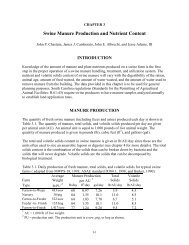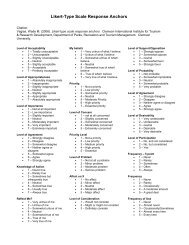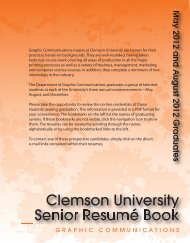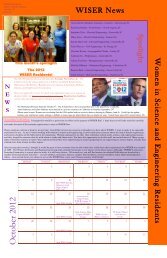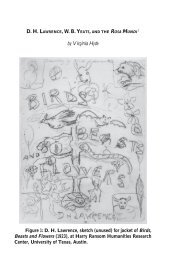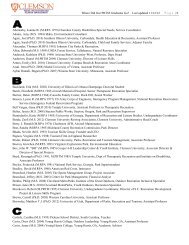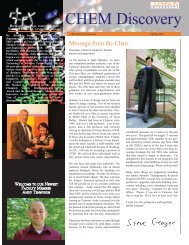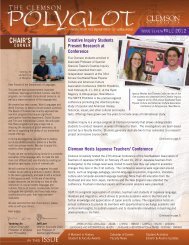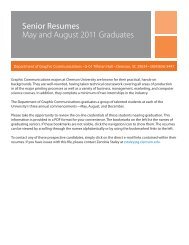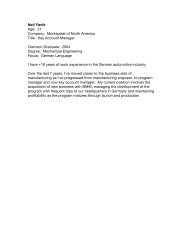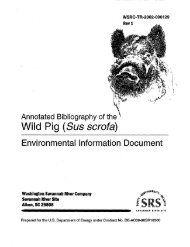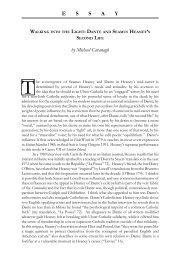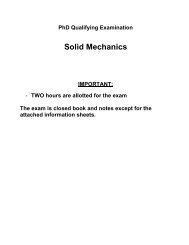Woolfian Boundaries - Clemson University
Woolfian Boundaries - Clemson University
Woolfian Boundaries - Clemson University
Create successful ePaper yourself
Turn your PDF publications into a flip-book with our unique Google optimized e-Paper software.
Performing the Self<br />
139<br />
series of mini-performances for her reader or listener. Her letters, for example, are often addressed<br />
to the alter-egos of the recipients, while her own alter-ego, tailored to that particular<br />
individual, is signed off at the bottom. Th e personae ask the recipient to collude in the creation<br />
of the fantasy, bonding Woolf and her reader in closer communion. Woolf’s personae<br />
found their origin in childhood when Virginia Stephen took on the role of Miss Jan who<br />
appears in stories, letters, and diaries. Her double becomes the receptacle for all childish<br />
misdemeanours and the means by which she is able to sublimate her social ineptitude. Miss<br />
Jan performs a therapeutic function, allowing Virginia Stephen to exorcise her anger, frustration,<br />
disinterest, and embarrassment. In an early diary entry, she records how she<br />
Sat and was talked to by Lisa, till another lady came in. Poor Miss Jan utterly lost<br />
her wits dropped her umbrella, answered at random talked nonsense, and grew<br />
as red as a turkey cock. Only rescued from this by S. proposing to go away. So<br />
we left, I with the conviction that what ever talents Miss Jan may have, she does<br />
not possess the one qualifying her to shine in good society. (PA 39)<br />
Real-life role-playing, while a rich source of creativity and entertainment, was also<br />
a means of survival. Woolf’s Miss Jan was one method of dealing with being a young<br />
lady in Victorian England and she was by no means alone in requiring such a strategy.<br />
Th e personae adopted by women were made necessary by their powerless position within<br />
society. Carolyn Heilbrun describes this process: “Lying with one’s body and one’s words<br />
is, among the oppressed, a dreadful necessity. Outsiders must often lie to survive. Only<br />
women, I think, have also consistently lied to themselves” (70). However, in the Stephen<br />
sisters’ cases they resisted believing the reality of their acts. Woolf recalls proudly how<br />
Vanessa eschewed social conditioning while superfi cially representing the model of it:<br />
Unfortunately, what was inside Vanessa did not altogether correspond with what<br />
was outside. Underneath the necklaces and the enamel butterfl ies was one passionate<br />
desire—for paint and turpentine, for turpentine and paint. But poor<br />
George was no psychologist. His perceptions were obtuse. He never saw within.<br />
(MOB 149)<br />
Role-playing for Vanessa and Virginia was an expediency, a temporary measure until freedom<br />
broke through with Leslie Stephen’s death.<br />
At its worst, dramatising life through role-play leaves the reader or audience uncertain<br />
as to what point role-playing becomes reality and at what point acting becomes<br />
being. Th e danger lies in seeing, according to Wilshire, “the off stage world only [in terms<br />
of] passivity, fascination, hypnotic-lie engulfment, or…instinctual cunning and calculation”<br />
(xv-xvi). Reading socialised behaviour as a “lie” or “act” can lead to the supposition<br />
that, as Erving Goff man warns, “all role playing and nearly all human behaviour [is]<br />
defensive or phoney” thus leading to the “doubt that a real self exists” (cited in Wilshire<br />
xvi). Brecht’s Verfremdung eff ect translated into life if you will. However, Woolf’s various<br />
personae which she plays out in the letters, or her refl ections on the multiplicity of the<br />
human character, lead more towards the conclusion that her diff ering tones do not always<br />
imply defence, deceit, or the loss of a unifi ed self, they simply enliven and entertain.



